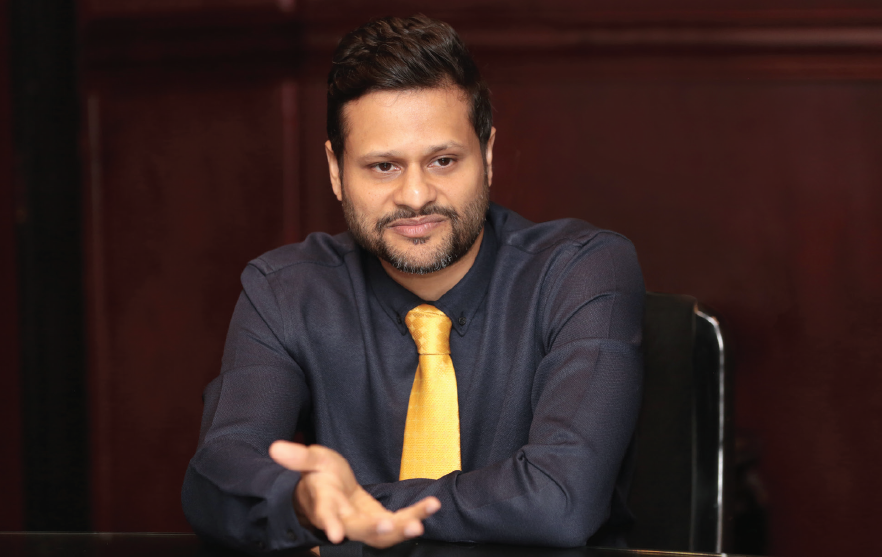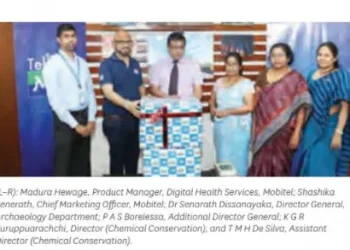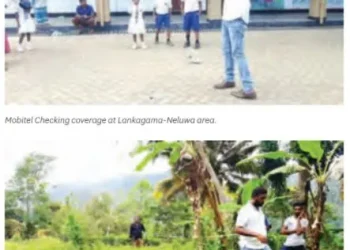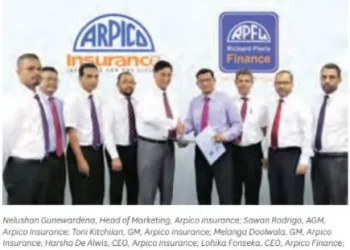By Udeshi Amarasinghe and Keshini de Silva.
Photography: Menaka Aravinda.
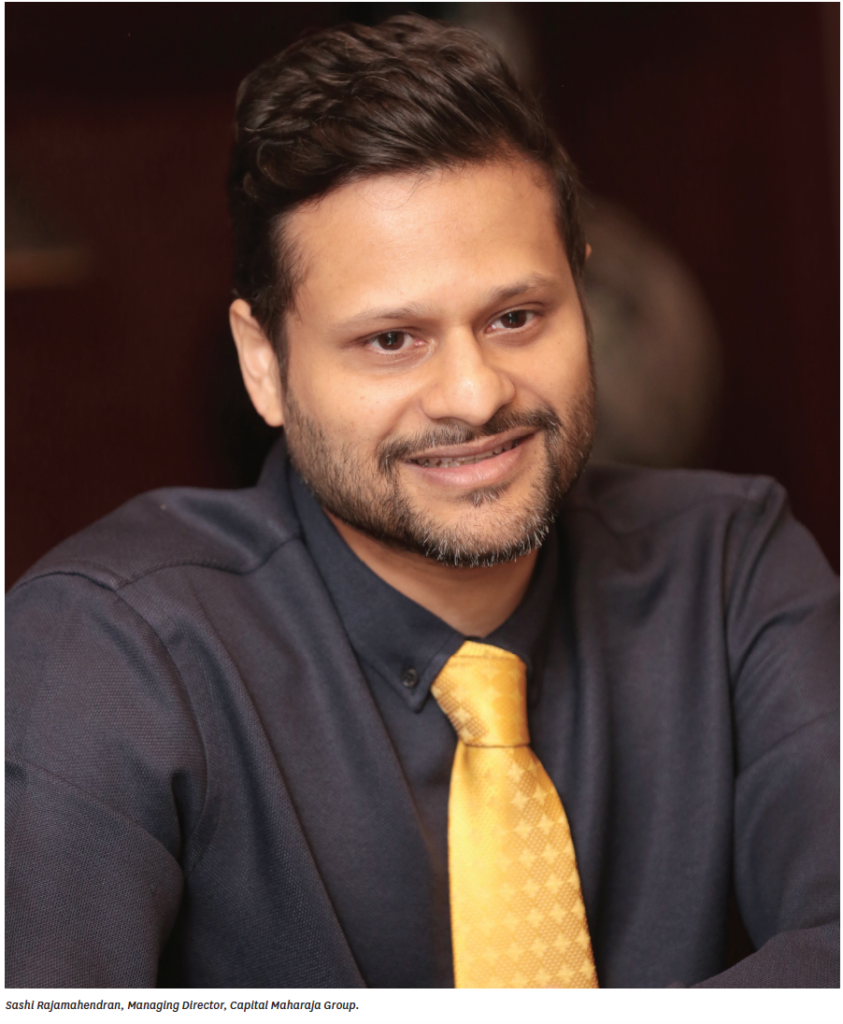
The Maharaja Group has rightly earned for themselves a reputation as trailblazers, innovators and created waves in the way they go about their business both locally and globally. Today this majestic group stands a multi-faceted conglomerate strongly positioned amongst the front runners in several business sectors, with multiple market leading brands in industrial, consumer and media sectors. For the first time ever, Sashi Rajamahendran, the third generation shareholder of the organization, and the Managing Director of the Group, gives an open and unabridged view of how the Capital Maharaja Organisation came to be, its 90 years of journey, and business beyond 2020 with the relaunch of the group as CMG : Capital Maharaja Group.
In your opinion, what is the most challenging situation your company faced in the last 90 years?
Since inception, our group has faced the Great Depression, Second World War, multiple global financial recessions, most notably the 1983 riots in Sri Lanka followed by a long civil war. During the war, our media stations were attacked multiple times by armed gangs and lives of our journalists were threatened. Having said that, I believe it is the current COVID-19 pandemic that has been the most challenging.
During the turbulence of 1983 almost half of your company was burned to the ground, you had to physically rebuild the company?
It was almost all, except for Maharaja Investments and AF Jones, it was a catastrophe of great proportion made worse by a run on our finance company due to panic. At that time, it was the worst thing that could happen to anyone, but it was internally controllable and within our own selves to find a solution, which we did and in fact honored every request for settlement to our depositors. The current COVID-19 pandemic is unprecedented and the entire world is shaken by its magnitude, and it is uncontrollable internally by ourselves, necessitating all the other pieces around the world to fall into place before we can act ourselves.
You need to understand that what happened in ‘83, however bad it was, only impacted the brick and mortar aspect of our business. Yes, it was chaos and caused disruption to the entire company, but the world economy was not impacted, like what we are seeing today after the COVID-19 pandemic. In 1983, as far as The Maharaja Organisation was concerned, it was completely controllable from within the Group, and we set our own directives to rebuild without any external impediments and trimmed ourselves to become a leaner organization.
It is vital for me to mention that we received unprecedented support from the Bank of Ceylon who were our main bankers, which went a long way in rebuilding. We rose literally from the ashes; within just a month of the riots we were able to restart some of the operations and by the end of the year we became stronger than we ever were before. But the COVID-19 pandemic is something entirely different because Sri Lanka was in lockdown for three months, with little we could do to salvage our business. There is a difference in intensity and extent here, and we will have to work really intelligently on issues outside our control, preempting world trends and government directives, if we are to come out of it.
In the case of the COVID-19 pandemic, the country’s leadership has managed the situation exceptionally well with regard to health and safety, and that has established the social and biological sustainability of Sri Lanka to be unique.
What do you foresee for the future of the economy?
One needs to have a sense of history when answering questions like these. If you take the COVID-19 pandemic, when thousands are dying across the world, Sri Lanka’s deaths are a mere 12 as of today. There is something in our makeup or the way in which we are managing the situation, that’s helping us to stay safe. But from a historic perspective, if one looks at the case of smallpox, which surprised us during the colonial era somewhere around 1700. That was in the Dutch period, which prevailed through to the British period in 1937. From what is recorded an average of about 100 people died from it every year, this is from colonial records from the time of the British.
The major reason for the spread of the disease in these times was the migrant plantation worker population from India who were transported here. However, this did not deter the plantation economy we enjoyed at that time — by the beginning of the second world war, we had a surplus in millions of sterling pounds, proof that the economy sustained despite the conditions prevailing. In the case of the COVID-19 pandemic, the country’s leadership has managed the situation exceptionally well with regard to health and safety, and that has established the social and biological sustainability of Sri Lanka to be unique. This shows that we need to be focused when dealing with uncertain matters relating to business and the economy of which we have no control. Health and safety are important, but we should not be discouraged by the pandemic – let’s wait and see, it is far from over.
I believe in most situations we are the lone tree on the hill. It goes without saying that we attract lightning, but to stand out is our mission in life, because we think differently. Our motto ‘the courage to be different’ was born from that thinking.
You are confident that your company will get out of this pandemic slump?
Yes, absolutely, I am confident about the future. We are always positive in our outlook.
Would you say that is the spirit of the Maharaja Organisation?
Yes, you could say that we have inherited a whole culture of positivity. As far as I know, there have always been challenges, even from my grandfather’s time, but we always came out of them stronger and wiser, because of our inherent approach to crises and issues. The Maharaja Organisation is known to give strong leadership, and we never back off, even when the chips are down.
How is Maharaja different from other companies – what is your USP?
That is for you to decide, but I believe in most situations we are the lone tree on the hill. It goes without saying that we attract lightning, but to stand out is our mission in life, because we think differently. Our motto ‘the courage to be different’ was born from that thinking.
Would you say this attitude makes certain groups uncomfortable?
Well, it would be unfortunate if it does because that’s not our intention, but it certainly is our culture, it is also our driving force. We have had many struggles right from the inception, but especially so in the last 40 years. We were called names and had to bear the brunt of vicious attacks for no fault of ours. The ‘83 violence was only the beginning. But through it all, we held fast to our identity of being a truly home-grown company; Sri Lankan we are.
Today, the length and breadth of this country believe and depend on our Sri Lankan Pedigree. The people know we are an integral part of them — part of the very fabric and the culture, traditions and economic core of this nation. But in order to get to that point, we had to hold our own, walking firmly in the belief that we would get to our destination. That is the mettle our group is made of.
It is the media arm that has the greatest visibility but the Group is much more. Can you elaborate on this?
Certainly, the media arm enjoys high visibility and it is true that we revolutionized the way people listened to and viewed radio and television in Sri Lanka. Our home-grown brands like Sirasa, Shakthi, Gammadde and News 1st have become part of people’s day to day lives and impact them daily having introduced the very first UHF transmission, which needed special antennas at a great cost to us.
Our group also set up the backbone for broadcasting transmission towers and GSM towers for Dialog. We pioneered reality TV and so many others that were entirely new – the list is endless, the impact dramatic. But the Maharaja Organisation is a diversified conglomerate with interests in a number of different verticals.
If you look at our history from about the early ‘80s, we forged several important milestones in this country. The Victoria dam under the accelerated Mahaweli project and the Samanalawewa dam were facilitated by us; the Prima Flour Mill in Trincomalee, the first GCEC (today’s BOI equivalent) company to establish here was another of our initiatives. The first wet magnetic separator to collect Rutile, Zircon and Illmenite from mineral sands was also designed and implemented by us to name a few innovations. The projects we fostered were all successes. We have not introduced any non-performing projects to date, as we believe in inculcating only the best and giving of our finest to the country first time back in 1957, when galvanized iron (GI) was the accepted standard internationally. Our interests spread to FMCG, Agrochemicals, Tea Exports, Electrical Appliances, Packaging, Leisure and IT. There is a reason for this level of diversification; we live on a small island, there is a limit to growth vertically, therefore we needed to grow horizontally. We did.
As an industrial group we were visionaries and introduced PVC pipes to this country for the first time back in 1957, when galvanized iron (GI) was the accepted standard internationally. Our interests spread to FMCG, Agrochemicals, Tea Exports, Electrical Appliances, Packaging, Leisure and IT. There is a reason for this level of diversification; we live on a small island, there is a limit to growth vertically, therefore we needed to grow horizontally. We did.
We have championed many brands, which are market leaders such as Parker, Thermos, Eva as well as Dialog. Such was the case with Anchor, we introduced the product to Sri Lanka and it soon became the market leader, and Sri Lanka the largest market for the Anchor brand in the world. After the brand’s success in Sri Lanka, they sort to acquire our shares, which we accepted and devolved controlling interest to them.
Was Anchor one of your biggest brands?
Yes, it was. Our Group has built many big brands and some of them were generic like S-Lon for example. We have championed many brands, which are market leaders such as Parker, Thermos, Eva as well as Dialog. Such was the case with Anchor, we introduced the product to Sri Lanka and it soon became the market leader, and Sri Lanka the largest market for the Anchor brand in the world. After the brand’s success in Sri Lanka, they sort to acquire our shares, which we accepted and devolved controlling interest to them. The New Zealand Dairy Board is now known as Fonterra in Sri Lanka. Similarly, we sold our share in Olé Springs Bottlers, our joint venture with PepsiCo Inc, after reintroducing the Pepsi brands to Sri Lanka together with our own popular local brand Olé.
Our proven track record of success with partnerships with foreign government organizations started with our Joint Venture with the New Zealand Dairy Board, a government entity that consisted of a collective of Dairy Farmers in New Zealand.
Subsequently we went on to partner with other foreign state-owned organizations such as Singapore Telecom and Telekom Malaysia, both government owned entities whose core business was TV/Radio and Telecom respectively. The partnership helped us to establish South Asia’s first GSM operator in Sri Lanka.
Interestingly, we launched Dialog, in Sri Lanka way before GSM telephony was introduced in our region and even before the United States. When we got into this business, we did not understand it much, yet we saw the potential of a new technology such as GSM. It’s enormous success today was because of the initial decision we made and the foundation we laid with the right partner at the right time.
But you gave up your interests in both companies?
Divesting our holdings in businesses we have built is very much a part of our expansion strategy growing from a small trading house in Pettah. Once these businesses become successful and their value appreciates, we use the proceeds to grow ongoing businesses or to invest in new ventures. It is the source of our seed capital, and the basis of our exponential growth. However, with Singapore Telecom, we did the reverse and acquired all the shares and took control of the TV/Radio business ourselves seeing the future in the vernacular.
The Maharaja Organisation began as a trading company. How did it grow into the conglomerate?
It all began when two friends, my grandfather Mr Sinnathamby Rajendram and his friend Mr Subramaniam Mahadevan, joined the American companies Dodge & Seymour and LD Seymour in 1930. When the second world war broke out in 1939, the American owners decided to go back home, the two friends acquired the companies in what was probably the first management buyout in Sri Lanka. In 1951 they incorporated their own establishments, my grandfather started Rajendrams Limited while his friend established Mahadevans Limited, making the Maharaja Building on Bankshall street their headquarters.
Mr Mahadevan passed away in December 1957 and my grandfather in September 1965. The businesses were passed on to the next generation, my uncle Rajendram Maharaja and my father Rajendram Rajamahendran. With the acquisition of AF Jones in 1967 we amalgamated and established The Maharaja Organisation Ltd.(TMOL).
Maharaja is a combination of the names of the Founders (Mahadevan & Rajandram), bringing all subsidiaries including AF Jones, Mahadevans, Rajendrams, Maharaja distributers limited and their respective agencies under one umbrella. By then, our origins as a Trading House in Pettah had started to evolve into the highly diversified corporate we are today. We entered the field of sports and attracted excellent talent both on and off the sports field, what we could not achieve on the front page, we achieved on the back page. Today, as the third generation shareholder, I hold the position of Managing Director of the group, my cousin Pradeep Maharaja is on our main board, and my sister Anjali Rajamahendran who is a Group Director overseeing our tea business globally.
With all this expansion, how is the Group now structured?
If you consider the set-up of the company, each Group Director manages one or more subsidiaries of the Group. Of course, there are the shared services such as Finance, HR, Legal, Information Technology and Digital and each has a Group Director in charge. The Operational Group Directors and the Service Group Directors report to the Group Director/CEO of the whole Group, who in turn report to me as the Managing Director and also to my father, the Chairman. The Group Director Internal Audit reports to myself as MD and to the Chairman. The Group Directors are given a free hand to operate and they are our strength on the upper management level. Apart from that we have the first and second tiers of subsidiary directors, CEO’s, GM’s and Senior managers who answer to their respective GDs. But at whatever level we are, something that is unique to Maharajas is the feeling of being a family and I would put that down to my father’s style of management and the empathy he has with each member of our staff.
Last year, we had 80 people who crossed the 25-year mark in their service to the company and over 60 will achieve it this year. In 2015, there were four people who crossed 50 years of service and there was even one gentleman who worked with us for 60 years. There are people within the organization I have known from my childhood and every time I walk around the many buildings of the company; I feel this strong sense of belonging. Many say I am not alone in that because they too have the same feeling of warmth and belonging and a large part of that is my father’s natural doing.
Amongst the past Group Directors are some stalwarts that need to be mentioned such as the late ELF Gunasekera, NA Gunawardena, B Mahinda, Ian Wickramanayake, Susil Munasinghe, Senerath Kapukotuwa, Mano Wickramanayake, Neil Chanmugam, Gamini Fonseka, Dr Austin Fernando, and Ravi Aluwihare.
My father despite being the cynosure both within the company and outside is quite the private person. He has never given an interview to the media, nor can you find his picture easily out there.
Your father is something of an enigma, the world does not know much about him. Can you share something?
My father despite being the cynosure both within the company and outside is quite the private person. He has never given an interview to the media, nor can you find his picture easily out there. In fact, I am diverging from his philosophy by providing this interview with his blessings. To start with I believe my father is a workaholic. He is available to his colleagues 24/7 and everyone including me, finds it hard to keep up. He knows the company at every level and many of the top management come from the rank and file of the company. He is always willing to listen to even the most junior member and he would not fail to accept their advice if he thought it would benefit the progress of the company or the individual. He has the ability to reinvent himself, learn fast and apply it at lightning speed; he thinks on his feet and in his sleep. But his most important attribute is the way he builds people. He can see potential and hidden traits in people, which they themselves did not realize existed within them. This has built him a loyal following within a grateful family. He has a fierce temper, but more importantly, he has a forgiving heart. Despite how conspicuous, loud and large we are in terms of the media, our family does not showcase themselves.
He has the ability to reinvent himself, learn fast and apply it at lightning speed; he thinks on his feet and in his sleep. But his most important attribute is the way he builds people. He can see potential and hidden traits in people, which they themselves did not realize existed within them. This has built him a loyal following within a grateful family.
Anything common you have with your dad?
I don’t measure up to my father’s experience and stature, but since my appointment as Managing Director in 2018, I have shared a lot of his responsibilities, and carried his work load. No one can be him. Speaking about myself my education and training are in other disciplines. I went to boarding school at Rugby in the UK from the age of almost nine and as for my academic background, I hold two degrees both from the University of Leeds. One of the degrees is in Electronic and Electrical Engineering and the other in Accounting and Finance. The last time members of our family held the two top positions in the company was when my father and his brother Mr R Maharaja were joint managing directors. Both cut their teeth on the trading hub of Colombo’s commercial district.
They brought a wealth of experience to the company, which is the strong foundation on which it is built. But that was a different era. As we stand on the cusp of the fourth industrial revolution and contemplate the disruption it could bring, I believe it would fall squarely on my shoulders to plan and execute the way forward of our Group. Our company is already well placed on the digital platform, and we will become much more reliant on digitalization and IT in the future while striving for higher levels of efficiency, as innovation takes center stage in our industries, and indeed our lives.
You spoke of the digital platform, what has Maharajas done in this area?
Even before the COVID-19 pandemic, we entered the digital space and floated several companies. The pandemic and the lockdown have accelerated the progress in this space and made us all aware of the importance of going digital and the many challenges of building an operating system that’s agile and responsive. It is not about e-commerce and running decent websites, but more about understanding the digital world in terms of what it can do for and with us.
With our new digital initiatives Kiki, Sambole, Bellboy we are forging new frontiers in technology interfacing across the country. We are also in Digital Advertising. Our popularity in traditional media continues in disruptive media. This July, we ended with our properties being viewed 78Mn times. This is merely the tip of the iceberg; digitization is not only restricted to social media. A group like ours has the ability to reach over 100,000 outlets at any given time and our objective is to make them all tech savvy and digitize with us. We implemented nine modules in nine operating companies into SAP in nine months, including the first time for the tea industry, winning the SAP Ace award in 2015 for the region ahead of Mahindra and Mahindra and Tata in India.
The most valued commodity in the future will be big data and that is how big companies will drive sales and marketing. We are well set to go on that journey.
Can you tell us about the many projects that are initiated to uplift the society, how active a role has the organization played in this area?
We don’t really like calling it ‘CSR’, although I do understand why the term is popular. Corporates must be Socially Responsible, if not how would they survive as an integral part of a community? For us, everything we do is an extension of a vision for a better nation. And this vision is why we attract people who are also interested in something more than themselves. Be it in business or community action across rural villages, we try to do things that will make lives better. I know that this sounds ‘nice’ but in actual fact it has involved years of hard work.
And of course, there are ups and downs. But we have found that making lives better, is a shared vision across communities; given the opportunity, Sri Lankans will come forward to help and support their fellow countrymen unconditionally. We have seen this for decades, especially when carrying out island-wide disaster relief efforts since even before the Tsunami. It is always the people who step forward to help each other at times of need.
This is part of our national DNA. And makes us unique amongst nations. The Gammadda Movement, began when my father asked the seasoned journalists at News 1st to step out into the village and ‘go to the people’. Today, Gammadda has been recognized globally including the UN as a flagship rural humanitarian movement and is also loved and trusted amongst all Sri Lankan communities. Gammadda has been cited as a case-study by the world’s top universities including Oxford and Brown while working closely with academic institutions such as The Clinton School of Public Service.
This did not happen overnight. All of us, at every level, volunteered our time, effort and expertise over several years to travel to our rural villages and spend time with the people, which gave us a deep understanding of the challenges they faced. It is this invaluable understanding that we harnessed to help support communities. We like to spend time understanding problems and then find lasting solutions. Our driving philosophy is ‘Action out of Truth’. And I must say the University of Peradeniya have been invaluable partners with our News 1st team on this journey. Together, we have worked tirelessly to uncover the facts and then act on them.
Today as a Group our community initiatives include The Gammadda Grassroots Movement, Sahana-Yathra Disaster Preparedness, Relief, Search and Rescue, The V-Force Volunteer Movement, The Nagitimu Sri Lanka Initiative and the Sri Lankan Lead at the Bali Process Global Movement against Modern Day Slavery, to name but a few. All focused on making lives better.
My Uncle, Mr R Maharaja and my father Mr R Rajamahendran took over the company. They too expanded the business in several different directions and gradually brought into fruition a people centric organization that is today known for building people, businesses and brands with integrity and goodwill, instilled by the founders.
How would you sum up the Group’s 90 years?
If we can distill the entire span of time to find one common thread, I can think of two words that define us, and they would be ‘Agility and Ability.’ These have always been the key to our success when opportunity presents itself.
If you take the period of my grandfather late Mr Rajendram and his friend late Mr Mahadevan, they were two young men from Jaffna, who came looking for opportunity in the big city and found it in the bazaar of 1930’s Ceylon. It was the port city of that time — a bustling environment, where various communities traded. When they came on the scene, men from the north had no real foothold in Pettah, yet within just 15 years or so, they were heading two companies, which were initially in trade but later branched off into a number of viable industries. They saw opportunity, they were agile enough to adapt to the environment and had the ability to run the course. It was the same when my Uncle, Mr R Maharaja and my father Mr R Rajamahendran took over the company. They too expanded the business in several different directions and gradually brought into fruition a people centric organization that is today known for building people, businesses and brands with integrity and goodwill, instilled by the founders.
